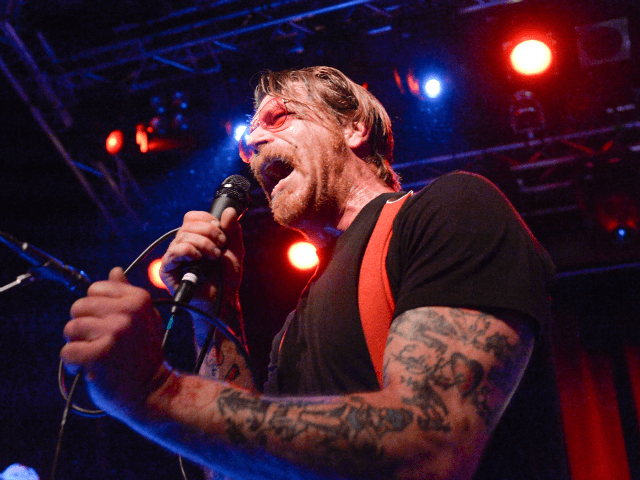Eagles of Death Metal frontman Jesse Hughes claimed that if everyone had guns, the Bataclan massacre may not have happened, as he returned to Paris Tuesday to play in front of hundreds of survivors of November’s terror attacks.
In a series of highly emotionally interviews, the American singer said France’s strict gun control laws “had nothing to do with” the jihadist attack in which 90 fans died. But he questioned whether gun control had saved any lives at the Bataclan.
“I don’t think so. I think the only thing that stopped it was some of the bravest men that I’ve ever seen in my life charging head first into the face of death with their firearms.
“I know people will disagree with me… but that night guns made them equal,” the 43-year-old told French TV station iTele. “And I hate it that it’s that way… Until nobody has guns everybody has to have them.”
Hughes — a member of America’s National Rifle Association and a supporter of Republican presidential candidate Donald Trump — told AFP earlier: “I don’t go anywhere in America without a gun anymore. That sucks. And I’m not paranoid. I’m not a cowboy… but I want to be prepared.”
Hughes vowed Tuesday’s gig would “be a regular rock show”, despite the area around Paris’ Olympia theatre being locked down by police, and a psychologist who has been treating the victims warning the concert could trigger panic.
“Rock and roll for me has always been fun and I am not going to let anyone take that away from me, or my friends,” he said, referring to the band’s fans.
Hughes, who will be joined on stage by band co-founder and Queens of the Stone Age frontman Josh Homme, said he hoped the gig will be the first step to emotional recovery.
“I hope I can walk out on that stage and be stronger than I am being right now,” he told AFP tearfully.
“I don’t want to fall to pieces in front of everyone. That is my biggest fear. This is therapy for me.”
Many of the survivors of the massacre at the Bataclan also see the concert as a form of catharsis “to end the nightmare” that began on the night of November 13, when 130 people were killed in coordinated shootings and suicide bombings across Paris.
Helene, who was in the front row when the killers burst in to the Bataclan, said she hoped seeing the band again would bring some closure. “It will allow me to finish” the concert, said the 42-year-old.
– Fear of panic, trauma –
But others said they were still unsure whether to go or not.
Guillaume Munier, 29, who survived by hiding in a toilet, said: “I’m going to go to the Olympia, but I really don’t know if I’ll be able to go inside.”
Eagles resumed the world tour in Stockholm on Saturday that they halted after the Paris attacks.
Hughes admitted he was “scared, really scared” by the weight of expectation on his shoulders.
“I understand what the people who cannot come are feeling. I know in my heart the right thing to do,” he said.
But psychologist Carole Damiani, who leads a support group for the Bataclan victims, warned some people could panic if the situation is not handled correctly.
While some fans who were wounded are physically well enough to be in the audience, the mental scars were still painfully raw, she insisted.
“When one person is panicking it is one thing, but a collective panic is something else,” she said.
Going to the concert with “the same music and in a similar venue only three months later, they will be plunged into a similar sensory atmosphere,” which could trigger trauma, she warned.
A team of 30 volunteer counsellors and psychologists will be on hand in the theatre, she said, adding: “No one should kid themselves that this concert is going to cure them and put everything right.”



COMMENTS
Please let us know if you're having issues with commenting.